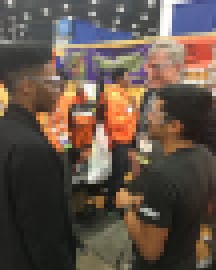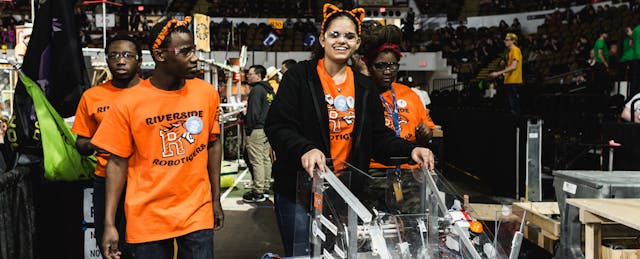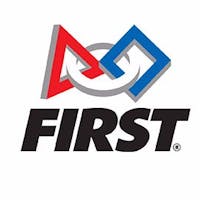For nearly 30 years, the global non-profit FIRST has been getting kids hooked on science and technology through hands-on robotics competitions featuring come-from-behind victories and breathless spectators clamoring for TV coverage. It all happens thanks to a network of corporate partnerships that let students peer into the real world of STEM careers while giving companies a chance to engage with ambitious and energetic students.
EdSurge spoke with Dave Vasko, Director of Advanced Technology at Rockwell Automation—a long-time FIRST partner—about how robotics competitions resemble the Indy 500; why you should be kind to your competition; the leg up FIRST kids have when landing STEM jobs; and one thing a kid-built robot can do way better than he can.
EdSurge: How does FIRST nurture the skillsets you are looking for in your workforce?
Dave Vasko: The science and technology experiences that kids gain in FIRST programs provide a strong foundation for the future. It’s just incredible to see the kids work in an environment where there’s competition and cooperation, where they are working together toward a common goal, applying the technology to these robots, developing control systems—and doing it all under pressure and with enthusiasm!
And they really deliver on their end goal; some of the tasks they do are astonishing. I remember a few years back, they had robots throw a frisbee much more accurately than I ever could.
When I was growing in my career, people had to have experience. But these days, I’m not looking for particular experience as much as whether people can work collaboratively as part of a team. Can they learn from other people? Technology is changing so fast that if I had to hire for experience, I’d be changing the majority of my staff every three years. I try to find people who can actually learn.

What are some of the advantages FIRST students have when they’re applying for jobs?
Some FIRST kids may be three-to-five years ahead of other kids. Someone can go through high school and take the science classes. They can go through college and do labs. But many of them have never worked on a big project. Many have never worked on a team where it’s hardware, software, mechanical engineers and marketing all working together. To have that experience so early on helps those kids really hit the ground running.
Have you been to any robotics competitions?
I have been to several FIRST competitions, and I can’t understand why they aren’t televised. They’re so exciting; it’s better than any sport I watch on TV. The atmosphere is so electric. It’s like car racing, with the pits where the kids are frantically working on the robots, making last-minute adjustments and enhancements. Then they wheel the robots out to the playing field. They have three robots on each side. So teams and their robots cooperate in a particular round to score enough points to move on.
There’s a very short period of time on the ground where the robots perform a predetermined task. And everybody has a different way of doing it. Sometimes something will break and the team has to do the best it can with what it has. That tells you a lot about the team and its resiliency, and what it can do under fire.
How does Rockwell Automation support FIRST?
More than 300 of our employees volunteer as mentors, subject matter experts, judges and referees.
Take Javion Mosley, who went to Riverside University High, a public school in Milwaukee. While on the Riverside RoboTigers FIRST Robotics Competition team, Javion learned about the high school internships at Rockwell Automation from his mentor, Emily Ralph. He started interning with us as a high school junior and credits the experience for shaping who he is and what he wants to do in his career. Javion is now a junior at the University of Wisconsin-Milwaukee and an application engineering intern at Rockwell Automation. He also gives back to the RoboTigers as a team mentor.
Last season we sponsored 215 FIRST programs in North America and had at least one employee mentor on each team. Rockwell Automation has been a FIRST strategic partner for more than 10 years, providing millions of dollars in monetary and in-kind contributions.

Among the FIRST tenets is “coopertition” and “gracious professionalism”—helping one’s opponents be at their best for a competition. How valuable are those concepts in the professional workplace?
It’s probably hard for people to believe, but we work with competitors all the time, particularly in international standards. In automation, we need to network our products together. It doesn’t make sense for every company to develop its own communications ecosystem. It makes sense for us to use and advance communications standards that many vendors can use.
Also, things change. It could be that a competitor, through an acquisition, is suddenly working alongside you. We try to develop good relations with our competitors and find common ground where we can work together.
Why is a diversified workforce important to you?
Rockwell Automation is about innovation. That’s the core of what we do—solving problems for our customers. The best way to do it is to have diversity in our workforce. If we have 10 people in the room who have exactly the same opinions and background, why do we need 10 people? We coordinate many innovation workshops where we have an idea we need to work on, and we’ll bring in people from all different parts of the company because they’ll all bring different perspectives—even if they don’t know the technology. That’s really a foundational part of the company that helps us address customers’ needs.

Why do manufacturing companies need global perspectives and evolving skill sets to survive?
Some factory jobs used to be very repetitious. But we’re seeing new jobs coming in that leverage new technology—particularly in robotics and artificial intelligence—requiring creativity and collaboration skills, and leading to exciting careers. It’s really changing how we approach the workforce and how we work on the skill sets that are required.
What’s more, there really are no local companies anymore. Everybody is a part of a global supply chain. Rockwell Automation has a presence in 80 countries. Even a small company in Wisconsin wants to ship their products all across the world.
What advice would you give a young person thinking about a STEM career?
I would say get into a FIRST program. If you don’t want to do software or hardware, there are marketing jobs. Get into cooperative environments, work with teammates. Try different things because you never know! There are people who have gone to college, gotten a degree, taken a job and on the first day realized they hated the job. At FIRST, you can try software one day, you can try hardware the next day, you can try mechanical engineering another day. You can try different things and really see where you get excitement. Where you get excitement is where you are going to do well.



